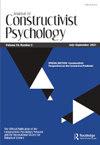Internal Dialogues and Authenticity: How Do They Predict Well-Being?
IF 0.7
4区 心理学
Q3 PSYCHOLOGY, CLINICAL
引用次数: 2
Abstract
Abstract Previous research and theoretical considerations on potential adaptive and non-adaptive functions of internal dialogues (IDs) do not allow to clearly predict the connection between internal dialogical activity and well-being. It was hypothesized that the link depends on the type of ID and its functions. Additionally, the study aimed to explore the role of authenticity in using IDs, their frequency and effects on well-being. Participants were 214 women and 193 men, aged between 20 and 60 years. Three methods were used: the Internal Dialogical Activity Scale-Revised, the Authenticity Inventory, and the Psychological Well-Being Scale. The results confirmed that authenticity is positively associated with well-being. The only type of IDs that highly authentic people conduct more often than those with lower authenticity are identity dialogues. This type of IDs shows a positive link with well-being, whereas the general internal dialogical activity as well as ruminative, maladaptive and confronting IDs are negatively related to well-being. It was also found that higher authenticity eliminates the negative relationship of maladaptive and confronting IDs with well-being. However, this is not the case with regard to the ruminative IDs. Moreover, it transpired that in highly authentic people perspective-changing IDs are conducive to higher well-being.内部对话与真实性:它们如何预测幸福?
摘要先前关于内部对话潜在的适应性和非适应性功能的研究和理论考虑不允许清楚地预测内部对话活动与幸福感之间的联系。据推测,这种联系取决于身份证的类型及其功能。此外,该研究旨在探索真实性在使用ID中的作用、使用频率以及对幸福感的影响。参与者包括214名女性和193名男性,年龄在20至60岁之间 年。采用三种方法:内部对话活动量表、真实性量表和心理幸福感量表。研究结果证实,真实性与幸福感呈正相关。与真实性较低的人相比,高度真实的人更经常进行的身份证类型只有身份对话。这种类型的ID显示出与幸福感的积极联系,而一般的内部对话活动以及沉思、适应不良和面对的ID与幸福感呈负相关。研究还发现,更高的真实性消除了适应不良和面对ID与幸福感的负面关系。然而,对于沉思ID来说,情况并非如此。此外,研究表明,从高度真实的人的角度来看,改变身份证有助于提高幸福感。
本文章由计算机程序翻译,如有差异,请以英文原文为准。
求助全文
约1分钟内获得全文
求助全文
来源期刊

Journal of Constructivist Psychology
PSYCHOLOGY, CLINICAL-
CiteScore
2.40
自引率
0.00%
发文量
22
期刊介绍:
Psychology and related disciplines throughout the human sciences and humanities have been revolutionized by a postmodern emphasis on the role of language, human systems, and personal knowledge in the construction of social realities. The Journal of Constructivist Psychology is the first publication to provide a professional forum for this emerging focus, embracing such diverse expressions of constructivism as personal construct theory, constructivist marriage and family therapy, structural-developmental and language-based approaches to psychology, and narrative psychology.
 求助内容:
求助内容: 应助结果提醒方式:
应助结果提醒方式:


